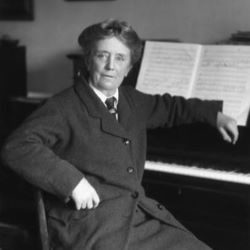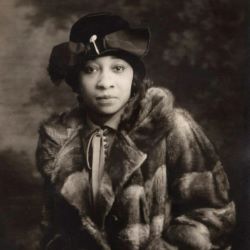Women’s History Month is a time to celebrate the extraordinary contributions women have made throughout history. In the world of classical music, this celebration extends far beyond the stage, recognizing the immense impact women have had on every aspect of this treasured art form. We’ve collected just a few resources to help you explore and discover favorites that may be new to you.
Women in Music History
While the history books often paint a picture of classical music dominated by European men, the reality is far richer. From early innovators to modern maestros, women have consistently pushed boundaries and left an indelible mark on the landscape of classical music.
Pioneers in Music
Women have been writing and performing music for centuries; in fact, many historians believe it was a woman who was the “first author known by name,” period. Enheduanna (2285-2250 BCE), an ancient Sumerian priestess, is credited with writing 42 poems in addition to psalms and prayers which we believe would have been sung.
In the 8th century, Kassia (810-865) formed a convent in Constantinople where she wrote at least fifty hymns, and Armenian hymnographers and poets Khosrovidukht and Sahakdukht are credited with writing liturgical chants that have survived to this day. In Western Europe, one of the first known female composers was German abbess Hildegard of Bingen (1098-1179), a prolific composer whose repertoire is among the “largest and most significant surviving collections” of compositions from the Middle Ages.
Breaking Barriers: From Private Performances to Public Stages
Often, the women who were recognized for their abilities came from musical families, such as Élisabeth Jacquet de La Guerre (1665-1729). Jacquet’s father and grandfather were both harpsichord makers, and her father taught both his sons and his daughters to play. This background gave her the opportunity to perform at Versailles for King Louis XIV of France when she was only five years old; she would later become a musician in his court.
In 1800s Europe and the Americas, it was common for upper-class women to learn to sing or play an instrument (often the harp, piano, or violin). However, these skills were typically reserved for private performances, as performing in public was considered immodest. These societal restrictions often inhibited women from rising to any sort of prominence in their field. Notable exceptions to this were pianist and composer Clara Schumann and vocalist Jenny Lind, who both toured extensively to much acclaim.
A Catalyst for Change
The 1900s saw a rise in women publicly performing and showcasing compositions, and the impact was felt beyond the concert halls – even going so far as to bolster women’s fight for the right to vote. When British suffragette Ethel Smyth (1858-1944) composed “The March of Women” in 1911, it became an anthem of the movement. The following year, she was arrested during a protest and sentenced to two months in prison. Supporters marched and sang the song outside the prison while Smyth leaned out a window, conducting with a toothbrush.
Nora Holt (1885-1974) was an American singer, pianist, composer, and music critic who became one of the first Black women to earn a master’s degree in the United States. She was associated with the leading figures of the Harlem Renaissance and co-founded the National Association of Negro Musicians (NANM) in 1919.
Progress and the Road Ahead
While the 21st century has seen a growing movement towards greater inclusivity and recognition of women in classical music, there is still work to be done. It wasn’t until 2005 that the first woman was selected to lead a major American orchestra when Marin Alsop was appointed the 12th music director of the Baltimore Symphony Orchestra. In that same month, Alsop made her mark as the first conductor to be awarded a MacArthur Fellowship.
In 2017, Chinese-born American Du Yun made history as the first Asian woman to win the Pulitzer Prize for Music for her opera Angel’s Bone. Du Yun was also selected for the roster of the New York Philharmonic’s Project 19 alongside influential women like Paola Pristini, Unsuk Chin, and Tania León.
Launched in 2020, Project 19 is a multi-season initiative that commissioned 19 new works by 19 women composers. Project 19 commemorates the 100-year anniversary of the 19th Amendment, which granted women in the United States the right to vote, though racial discrimination in voting laws persisted for decades. The project is the largest women-only commissioning initiative in history.
Opportunities for women to perform at a high level often start at a very young age – at music schools like Levine. To increase the visibility and representation of women in music, we must all learn and work together to empower girls and women to pursue their dreams in the arts.
Delving Deeper
This glimpse into the world of women in classical music is just the beginning. Explore the works of these remarkable individuals and discover countless others who have enriched the world through their musical contributions.
Here are some resources to inspire your exploration:
Programs Supporting Women in Music
While celebrating notable women throughout music history is important, it’s crucial to also support and empower women who are actively shaping the musical landscape.
-
-
- International Alliance for Women in Music advocates for women in music around the globe and promotes their music through concerts, competitions, conferences, and grants.
- Women’s International Music Network works to connect women in all facets of the music industry.
- Women’s Opera Network is an action group of opera professionals dedicated to advancing gender equity for all who work in the industry.
- Sphinx Organization provides scholarships and performance opportunities for young Black and Latinx musicians.
- Boulanger Initiative advocates for women and all gender-marginalized composers by celebrating, performing, and supporting music composed by women.
-
Discover
-
-
- “The March of Women” by Ethel Smyth was an anthem of the suffragette movement in the UK. You can watch a performance of the piece by the Glasgow University Chapel Choir.
- Her Story is a composition by Julia Wolfe that honors the ongoing struggle for equal rights and representation for women in America. Learn more about the piece and check out a short clip from a performance by the Boston Symphony Orchestra.
- Learn more about Project 19, and watch and listen to the works of these composers.
-
Play
Enhance your repertoire with pieces composed by women! There are several databases that have compiled works to explore.
This Women’s History Month, take some time to explore the music of these remarkable women. You can discover their work through online resources, attend a concert featuring female composers or performers, or simply share their stories with others – but we think the best way of all is to add them to your repertoire. By amplifying their voices and celebrating their achievements, we can ensure that the future of classical music is as diverse and vibrant as the women who shape it.
Community and Accessibility at Levine
Since our founding in 1976, Levine Music has been committed to cultivating an inclusive and supportive community that educates, inspires, and provides opportunities for all students, families, faculty, and staff. The art form of music has developed throughout the course of human history, serving a variety of sacred and secular functions in the history of nearly every culture across the globe. In our study of musical traditions past and present, we come across examples of historical figures, events, and ideologies that contradict our values. In our role as music educators, Levine not only provides context for these examples but also provides opportunities to expand our repertoire to include works, genres, artists, and cultures historically excluded from the canon.
Levine’s Community and Accessibility Working Group meets regularly to ensure we embody these ideals by monitoring our work, creating best practices, and encouraging transparency in the continual integration of Levine’s core values throughout our campuses and programs.
Learn more about Levine’s commitment to Community and Accessibility and our Community and Accessibility Working Group and its initiatives.




